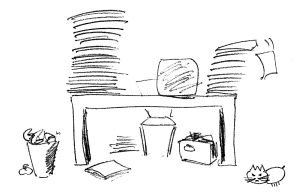It is a sad but incontrovertible fact that one of the unfortunate effects of technology is that it provides some people with the excuse they need to abrogate all sense of personal responsibility or discretion. Note that I don't say the rise of technology causes people to behave in particular ways, just that it creates conditions in which such people can thrive.
This was epitomised and satirised by the Little Britain sketches on the theme of 'The computer says 'no'!" (See below for an example.)
Automated menus are another manifestation of this phenomenon. The worst ones are the ones where you end up in a sort of closed time loop, in which, after ten minutes of increasingly 'niche' destinations you end up in the same menu you started at.
Possibly the absolute worst one was the one which, after ten minutes getting me to the extension I wanted, announced that the office was now closed and that I should try again in the morning. I quite like the automated answering machine script in this context.
 The Oyster CardYesterday I raced for a bus and placed my Oyster Card against the automated reader. The Oyster Card is a kind of cashless travel ticket that stores details of all your journeys on the Transport for London system. It probably also stores how many cups of coffee you've consumed, the point you're at on your circadian rhythm cycle and details of your DNA.
The Oyster CardYesterday I raced for a bus and placed my Oyster Card against the automated reader. The Oyster Card is a kind of cashless travel ticket that stores details of all your journeys on the Transport for London system. It probably also stores how many cups of coffee you've consumed, the point you're at on your circadian rhythm cycle and details of your DNA.
The wretched machine bleeped twice.
"What does that mean?", I asked.
"It means you haven't got any money left on the card", came the response.
"OK, how much is it then?"
"Two pounds."
"Two pounds?!" I exclaimed. "Good grief."
I rummaged around for some money, but found just a few loose coins.
"Can you change a ten pound note?" I asked.
"Where are you going?"
"The station".
"Forget it", said the driver.
"Really?", I said. "You are a gentleman, Sir."
In times gone by I would have written to the bus company, giving the time and route on which I was travelling, to thank them for such commendable service. If I did that now, he'd probably lose his job for not following some set of rules to the letter.
But it was a pleasant experience to meet someone who could exercise a bit of judgement, and show a touch of humanity.



